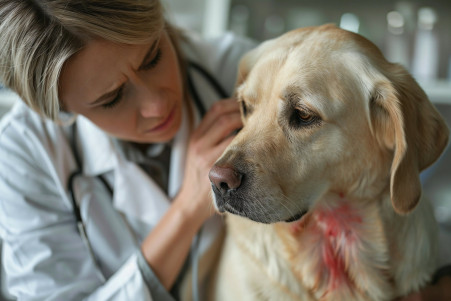Can Dogs Get Chicken Pox? Veterinary Facts Revealed
23 May 2024 • Updated 23 May 2024

Can dogs catch the varicella-zoster virus that causes chicken pox in humans? While it's not impossible, it's highly unlikely. However, dogs can get a different pox-like virus called canine parvovirus, which is a serious and sometimes fatal condition. Canine parvovirus is a highly contagious virus that affects puppies and unvaccinated dogs, and it can cause symptoms such as fever, lethargy, vomiting, and blisters on the abdomen.
This article will help clear up whether or not dogs can actually get chicken pox and cover symptoms, transmission, treatments, and prevention by looking at evidence from veterinary and virology research. You'll learn about how the rashes caused by parvovirus and other viruses can look like chicken pox, why dogs are usually immune to the varicella-zoster virus, and what veterinarians recommend to keep your dog safe.
Can dogs get chicken pox?
Canine Parvovirus
Canine parvovirus is a highly contagious viral disease that mostly affects puppies and unvaccinated dogs, says WebMD. The virus is especially dangerous because it can live in the environment for long periods, says the Britannica entry, which means it can be easily spread. It is spread through direct contact with infected dogs or their feces.
The virus has evolved to become more and more virulent, leading to severe enteritis, bloody diarrhea, vomiting, and dehydration. While there is no cure, supportive treatments like fluid therapy can help dogs that have been infected, says VCA Animal Hospitals. It's important to catch the virus early and treat it properly because in puppies under 3 weeks old, the virus can lead to death in as little as 48 hours, says WebMD. Good hygiene and disinfecting are the best ways to prevent the spread of the virus.
Symptoms and Diagnosis of Canine Parvovirus
The most common symptoms of canine parvovirus are fever, lethargy, loss of appetite, vomiting, and severe diarrhea (often bloody), says WebMD. Puppies who are infected before they are 3 weeks old will have a more severe, fast-moving form of the disease that can result in death within 48 hours, according to WebMD. Other symptoms in puppies can include respiratory issues, seizures, and blisters or rashes on the belly, according to the Britannica entry.
Diagnosis usually involves a physical exam, medical history, and lab tests to confirm the presence of the virus, according to Britannica. It is important to catch the disease early and seek veterinary care to help manage the disease and improve the chances of recovery, says VCA Animal Hospitals.
How to Prevent and Treat Canine Parvovirus
According to Britannica, vaccination is the best way to prevent canine parvovirus, and it is typically given when a dog is between 6-12 weeks old and then annually after that. In addition, maintaining good hygiene and disinfecting contaminated areas are important in preventing the virus from spreading, according to WebMD.
There is no cure for canine parvovirus, but supportive care including fluid therapy, anti-nausea drugs, and antibiotics can help control the symptoms, says VCA Animal Hospitals. In some cases, dogs will need to be hospitalized so they can receive the care and monitoring they need to recover. However, the earlier the infection is caught and the sooner the dog is treated by a veterinarian, the better the dog's chances of recovery, according to Britannica.
Other Skin Conditions in Dogs: Causes and Symptoms
Although canine parvovirus is a potentially life-threatening viral infection, there are many other skin conditions that dogs can suffer from that have similar symptoms, according to WebMD. Allergies, bacterial and fungal infections, parasites, and autoimmune diseases are all common causes of skin problems in dogs, according to an article from The Spruce Pets.
Symptoms of skin problems in dogs can include itching, redness, hair loss, skin irritation, rashes, blisters, and discoloration, according to PetMD. The article lists pyoderma, dermatitis, mange, ringworm, and yeast infections as examples of skin issues that dogs can suffer from.
All of the sources recommend seeking medical care if your dog is experiencing skin issues that are severe or that don't go away in a timely manner so that the cause can be identified and the appropriate treatment can be administered. This knowledge is important for helping to ensure that your dog stays healthy and happy.
Zoonotic Skin Diseases: How to Keep You and Your Family Safe
Although zoonotic skin diseases are rare, some of the skin conditions that affect dogs are zoonotic. According to the PubMed study, common zoonotic skin diseases include ringworm, scabies, and mite infestations, all of which are spread by direct contact or contact with contaminated environments. The US Pharmacist article says that in humans, these diseases can cause rashes, itching, hair loss, and skin irritation, among other symptoms, depending on the disease.
Preventative measures like handwashing and avoiding contact with infected animals are important, as the CDC explains. The Merck Manual says that getting pets treated promptly and making sure they receive the proper care for their skin conditions can help lower the risk of zoonotic transmission. Making sure that pets and their owners practice good health and hygiene habits is the best way to prevent the spread of zoonotic skin diseases.
Conclusion: How to Keep Your Dog's Skin Healthy
While dogs cannot contract the human varicella-zoster virus that causes chicken pox, they can develop similar viral illnesses like canine parvovirus. Canine parvovirus is a highly contagious and potentially serious disease, especially for puppies and unvaccinated dogs. Prompt veterinary attention, supportive care, and preventative measures like vaccination are crucial for managing and preventing the disease.
Dogs can also develop various other skin conditions, such as allergies, infections, and parasitic infestations, which require proper diagnosis and treatment. Maintaining good hygiene, regular grooming, and seeking veterinary care for any persistent skin issues can help ensure the overall health and well-being of your furry companion.


